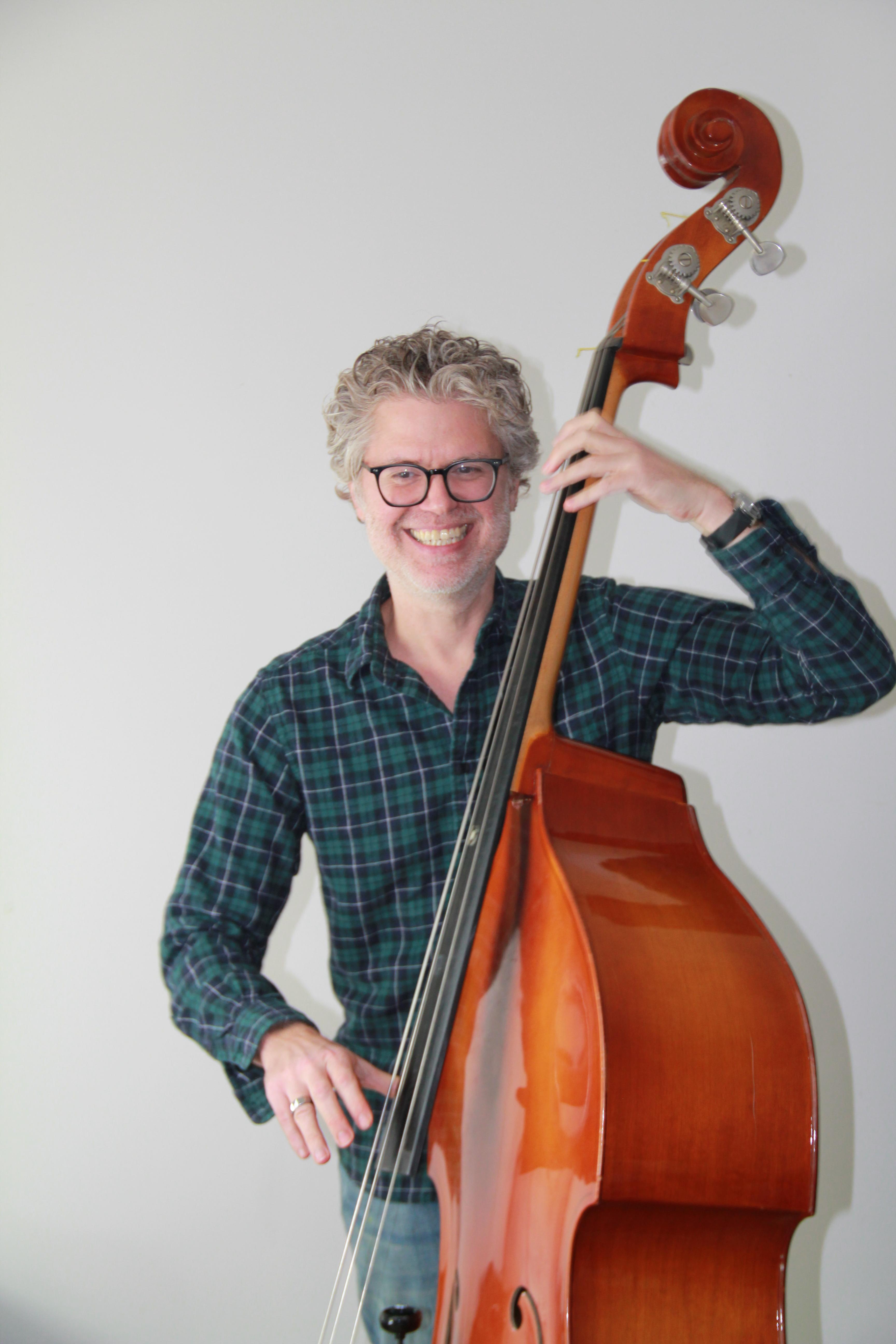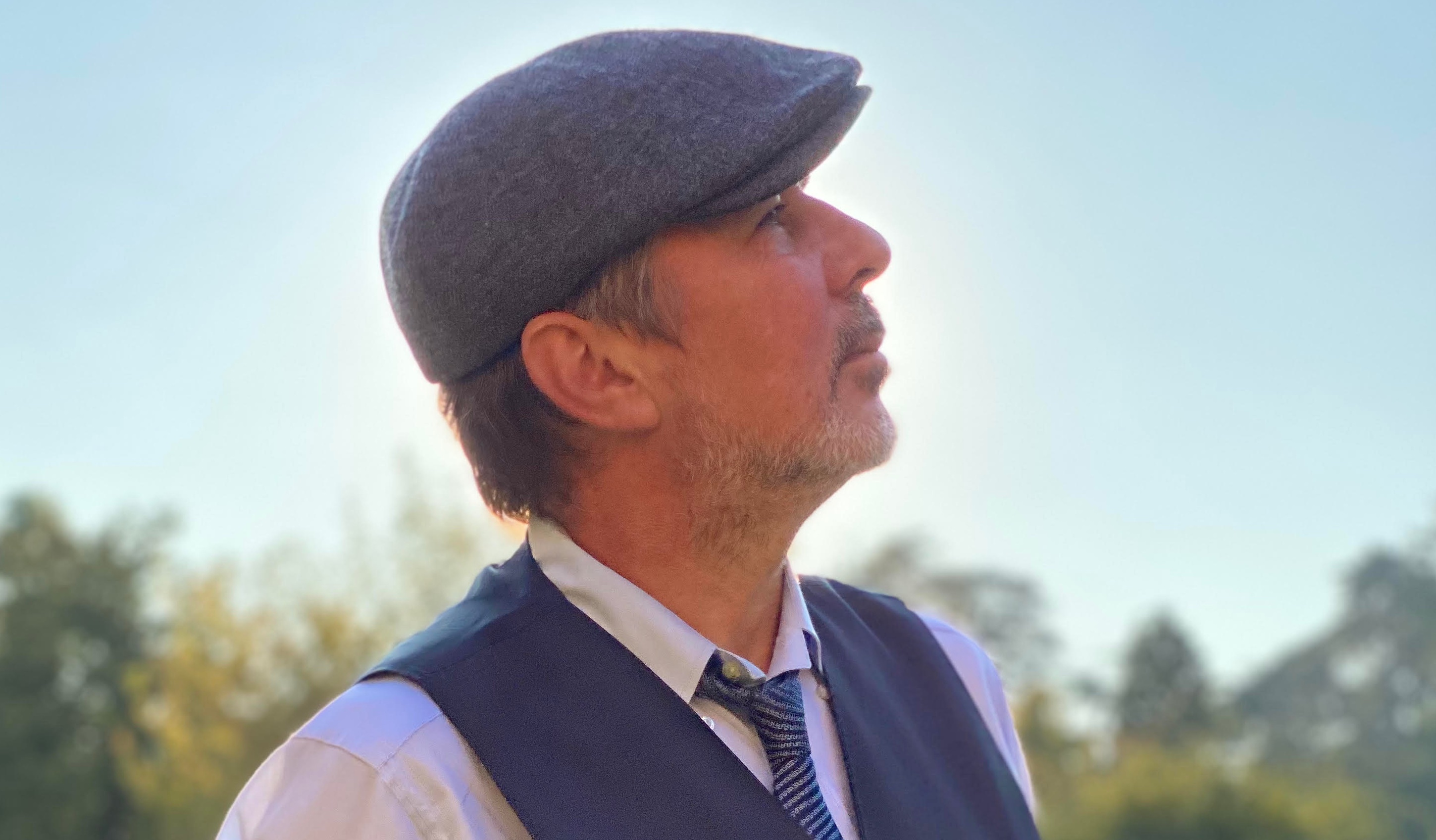My first 5 months at Musiversal as a Session Bassist
I’m Bruno Migliari, bassist at Musiversal 🎸
A Rio de Janeiro native with Italian roots, I have over 30 years of professional experience, acting mainly in the Jazz, Brazilian Music and Pop/Rock scenes.
I play bass and sing backing vocals for prominent Brazilian artists, such as singer/songwriter/guitarist Frejat (since 2001) and singer Simone (since 2013). I have also played live and/or recorded with many other well-known Brazilian artists, such as Ivan Lins, Milton Nascimento, Marcos Valle, Ana Carolina, Maria Gadu, Fernanda Abreu, Denise Reis, Lobão, Paulinho Moska, Leoni – as well as artists from other countries, such as Lokua Kanza (Congo/France), Quexie Montana (Zimbabwe), Susanna Stivali (Italy), Chester Harlan (Italy/France), Avi Wisnia (USA) and Joani Taylor (Canada).
My own projects include the Pedigree Dogs band, the Notre Jam jazz quartet and my latest album Bicho Músico.
I joined Musiversal in October 2021, and in this blog post I’ll write about my first 5 months as part of this music-making team!
My music background
I started out in music when I was 14 years old. Bass was my instrument of choice from the get-go…
I took a deep dive into the bass universe right away, and through the guidance of experienced teachers I was exposed very early on to the wealth of Brazilian music, to the mesmerizing canons of the jazz tradition, to the depth of classical music and to the excitement of rock/pop.
I was soon joining bands and by the time I was 17 I got my professional musician card and started working, being accepted at UNIRIO Music College in 1989, and obtaining a Bachelor's degree as double bassist in 1994. Soon after that I joined (Brazilian rocker) Lobão’s band and started recording and touring with him, playing all around Brazil and even touring in the USA. Around the same time, I joined Paulinho Moska’s band, and as usually happens with most musicians, once you get noticed by a few artists, you start getting invitations to play with many more…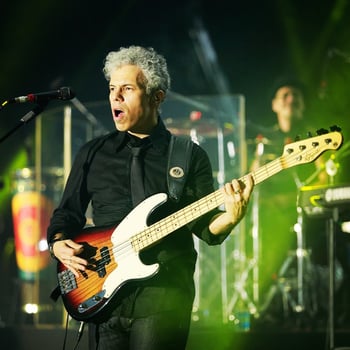
In 2001 I got invited to form (singer/songwriter/guitarist) Frejat’s band, and have been playing with him for a solid 21 years now - and counting! That included many tours around Brazil, main stage concerts on 3 editions of the world-renowned Rock in Rio festival (the 2011 show is available on DVD) and a few international concerts too - as well as 2 seasons (2005 - 2006) of a TV show called Claro Q É Rock, on which I also acted as the band’s musical director.
I also played with singer-songwriter Ana Carolina on the Dois Quartos tour and recorded a live album/DVD during that stint (2007-2010). I recorded with singer Simone in 2013 and joined her touring band right after, having done concerts all over Brazil and in Europe as well, the latest tour reuniting her with longtime collaborator Ivan Lins - one of Brazil’s most beloved songwriters.
I’ve released 3 albums of personal projects: “11 Cabeças” (2004)- an 11-piece instrumental ensemble I co-led with saxophonist/arranger/composer Henrique Band, “Amicizia” (2007) - a collaborative effort with Italian guitarist Chester Harlan, and “Bicho Músico” (2018) - and album of self-penned songs and instrumentals.
In 2012 I was invited to be the “house band’s bassist” for the first season of the prestigious The Voice Brazil TV show, and in 2020 got the call to do the same job on a similar TV show, The Four Brazil.
I was just finishing that gig when the pandemic hit…
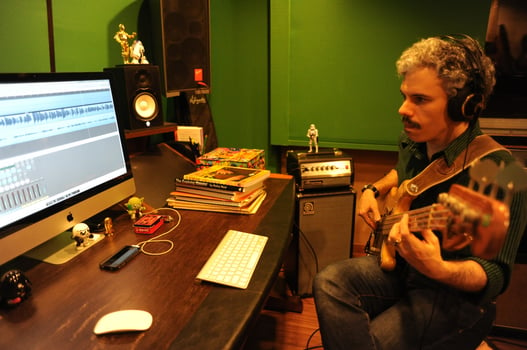
Musiversal and me...
When the Covid pandemic hit, my finances took a harsh blow. Whilst the world went into lockdown, concerts and tours were canceled. I suffered an 80% loss of income.
I had to rely on online teaching and remote recording services to make a living, which fortunately I had already started offering through my own website “Professional home studio” and on other platforms since 2016. Since then, I had been marketing my services consistently on Instagram, and it’s there that I first came across Musiversal through an ad.
The Musiversal concept went far beyond the “uberization” of studio musicians adopted by most remote recording platforms; that was already evident on the very first ad that I saw. I instantly decided to apply for a bassist position, as I felt that I was a “perfect fit” for the job.
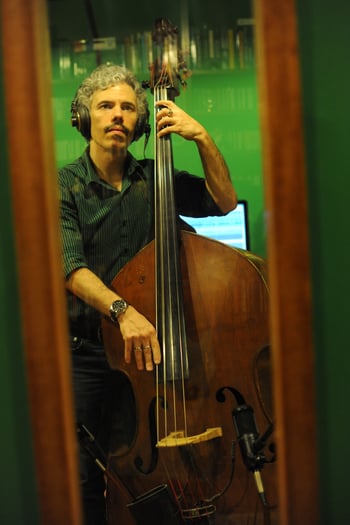
The application process was very meticulous, and I could feel that these guys were taking their mission very seriously - which only pushed me to present my best. After being approved as a valid candidate, it was time for the ‘mock sessions’, which for us musicians are pretty much what flight simulators are for airline pilots… one can crash and burn, or fly high! Happily, I managed to keep my 4-string plane airborne for the duration of the sessions, and got approved by recruitment (which, by the way, are very nice guys and accomplished musicians in their own right).
I was exhilarated when I got the email saying that I was in, with a copy of the contract attached! But soon after I signed it, I got a second email explaining that my onboarding would have to be postponed due to a gap between sessions’ demand and the number of musicians contracted (I was the fourth bassist to join the ranks of Musiversal). Waiting a few more months was by far the hardest part of the whole process for me… I remember being asked by recruitment “when can you start doing sessions for us?” and then answering “yesterday!”
As hard as it was, all things came to a conclusion and here I am now, committed to doing 15 sessions per week and hoping for more! It’s been quite an adventure, with the best soundtrack I could hope for.
A day in the life at Musiversal
I’m currently doing 5 sessions a day, from Tuesdays to Thursdays, which means I dedicate either the afternoons or the mornings of those days to Musiversal - and those five hours can be truly a “music-rollercoaster” which makes it all the more exciting for me, as I am always interested in playing different music styles and different basses (electric, fretless and double bass).
Clients come from different countries, different cultures, and very diverse musical backgrounds: I’ve done sessions for experienced orchestrators writing scores for movies, theater and dance companies - playing the double bass (both arco and pizzicato); I’ve recorded on lots of singer-songwriter material (on both the double bass and the electric bass); I’ve done a fair share of adventurous pop songs and fusion with the fretless; and I’ve also done some punk-rock tracks playing with a pick. Sometimes all of that in sequence!
One very positive side-effect of having those fixed hours is establishing a healthy daily routine…we musicians know the importance of discipline to sustain and develop our abilities and musical knowledge, but it is also very hard to maintain that when we usually don’t have regular working hours and everything changes from one week to the other. Since I started working with Musiversal, I’ve been waking up at 06:40, hitting the gym at 07:00 and being active in the studio by 09:00, preparing for the day’s sessions. That makes my day very productive, as by the time I’m done with the session work I can practice, compose, rehearse or go out for a gig (those are making a come-back, little by little…)
Having a stable job in music
So far, in my personal experience as a professional musician I’ve been lucky enough to have had very stable long-term engagements with established artists. I’ve played with Lobão and Paulinho Moska for 5 years each, have played with Ana Carolina for 3 years, and have been playing with Frejat for 21 years - so I can say I have as much stability as a side man can hope to have. But we know that even that cannot be compared to having a regular income, as artists’ schedules can vary dramatically from one month to another, gigs get canceled and concerts postponed, but the bills always need to be paid on their due dates.
When I was presented with the possibility of making a steady income recording from home, I jumped at it. I had set up my home studio with the main intent of offering remote recording services, so that just made perfect sense to me. On top of that, I depend solely on myself when working as a remote studio musician for Musiversal, which is quite different from every other working situation I am familiar with as a sideman.
Musiversal’s culture - a true sense of belonging
I had a good feeling about the Musiversal staff based on what transpired from our email exchange during the auditioning process. I communicated mostly with João Soeiro and Vinicius Castro - two sweet guys that dealt with the bulk of the process of selecting the musicians. But I also exchanged emails with the CEO, André Miranda, and they all struck me as extremely polite and considerate individuals.
It also became clear upon reading the contract and the subsequent tutoring I got from other team members that this was a company created by musicians to empower musicians and music creators in general, so these guys new what they were up to, what was at stake and which would be the key points that could potentially be “turn ons'' or “turn offs” for their fellow musicians.
This paved the way for mutual understanding and has gone a long way into establishing a true partnership and sense of “belonging”, of partaking in the challenging and yet very stimulating enterprise that Musiversal is as a company. After a few months engaging in communication with other musicians and staff members within the platform’s channels, a true sense of community developed, and friendships took root. It’s been a very positive experience so far.
“This is a company created by
musicians to empower musicians”
As far as the musical growth one can expect from being continuously exposed to diverse types of music, nothing really compares to being a session musician for Musiversal.
The closest thing that comes to mind is my experience as the “house bassist” on TV music shows, such as The Voice Brasil and The Four Brasil, in which the musicians involved get to record several tracks a day with a very broad stylistic palette. Still, there’s a factor missing from that equation that’s there in Musiversal: not only does the type of music differ from one session to the other, but the whole “modus operandi” of each client on the platform can be dramatically different. Some clients will send me a very detailed score (complete with bowing marks, as I would see on the orchestra stand), while others will send me just an audio track and leave it to myself to figure out what’s going on harmony-wise and what to play over their basic tracks.
Those extremes and everything in between are part of my daily routine, so I can honestly say I’m becoming a better musician: I’m sight-reading complex scores very often, I’m figuring out harmonies with minimal preparation, I’m transcribing guide bass lines by ear, I’m playing music that is technically challenging in some situations, and on other situations I’m dealing with pacing and restrain while building strong bass lines for very simple songs with repeating structures. So I’m talking about a very broad range of musical growth here, and I cherish that.
Musiversal will set a new standard in the music industry
Having had the previous experience of doing remote sessions within the “gig economy” model adopted by other platforms, I can attest to the positive impact Musiversal’s model can have on the music industry as a whole.
By offering musicians a fair salary, Musiversal is both bringing them in as crucial actors of the music-making process (which is kind of obvious, but not always taken into consideration), and that helps create a sense of “belonging” to a team, with a common goal. Very quickly I understood that my personal success as a session bassist in the platform helps push Musiversal forward, in the same proportion that every single increment in the company’s growth helps me achieve more success as a session musician. So much so that I can say that my next goal is to work 25 hours a week for Musiversal (guys, if you are reading this, I really mean it! - lol).
By succeeding with its own model, Musiversal will set a new standard for companies offering remote recording services, and one that is more sustainable and fair. From where I stand, Musiversal acts like those old-school music labels that used to employ a "house band" (a roster of top-notch, carefully seleted musicians who would record most of the label's catalog) - the main difference being Musiversal is not putting out the music itself. The artists are doing that, which makes Musiversal the "bridge" that covers the void between the best aspects of those old school labels (the undisputed quality of the musicians and engineers involved in the recordings) and the artistic freedom and democratization of music production that came of age with the streaming platforms and new ways of publishing music.
I hope to see Musiversal grow in the next five years - preferably steadily and continuously. As the model becomes more and more sustainable, more subscribers will join the platform which will create demand for more musicians to be brought into the fold and for experienced providers like myself to work more sessions every week!
I sincerely think Musiversal is “turning the future into the present” with its business model, and the music industry as a whole should pay close attention, take note and support its growth.
By democratizing and demystifying the music-creation process, Musiversal is basically enabling everyone and anyone to create music. This stimulates the most positive of our qualities as human beings: creativity.
Simply put, Music makes us better. By creating favorable conditions for anyone to engage in music creation, Musiversal is increasing demand for musicians and engineers and, in the end, creating job opportunities that are sustainable in the long-term.
“Musiversal is basically enabling
everyone and anyone to create music”
When I started out on the remote recording game back in 2016, I thought “man, this is the future, I gotta jump into that train!”. Well, just 4 years in and the future has become the present. Ain’t no time like now - and now’s the time!
There’s infinite music to be made out there, preferably in a way that is fair to everyone and sustainable in the long run. Let’s make music!

